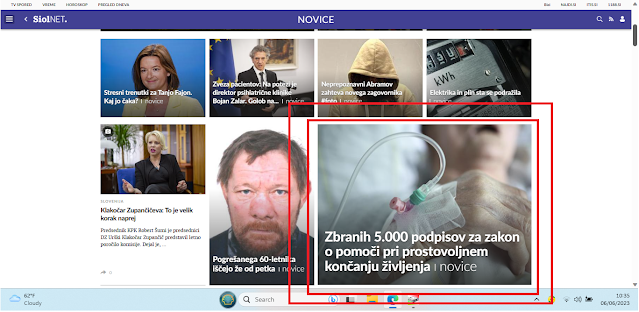No exception was article as you see bellow with which Slovenian politicians begun to brainwash me on future fathers' health situation - they used neighbours and beyond to suggest me how many people and even some of them would gladly took option if available. They heavily insisted me to get rid of father even through what you see bellow...
The law resolves the autonomy of life and death decisions for a terminally ill person
According to them, the current legislation does not regulate the situation at the end of life, when some people die suffering and without dignity, because neither drugs nor palliative care can help them. "The purpose of the Act on Assistance in the Voluntary End of Life is not to replace poorly functioning palliative care, but rather the law resolves the autonomy of life and death decisions for a terminally ill person. Palliative care and the Act on Assistance in the Voluntary End of Life are not mutually exclusive, but complement each other, as the law promotes the development of palliative care and is not an alternative to it," they stated.
According to Srebrna nita, the draft law regulates the possibility of assistance and a dignified ending of life for adult, compulsorily insured persons in the Republic of Slovenia who suffer unbearably and cannot hope for an improvement in their health condition. The law excludes this option for children or persons under the age of 18, for persons who do not have physiological reasons for suffering, and for persons with mental disorders. Also, persons who are tired of life, persons who are not capable of making decisions about themselves, or relatives do not have the right to assistance in voluntary end of life.
Zero chance of abuse
According to the association's assessment, the actual possibility of abuse is zero, as the law sets strict conditions under which the decision to voluntarily end life is made after careful consideration of all possible palliative treatment options, presented options for alleviating suffering through palliative care, and after a discussion with the chosen or substitute doctor , independent doctors, psychiatrists, the commission and other experts.
The law resolves the autonomy of life and death decisions for a terminally ill person
According to them, the current legislation does not regulate the situation at the end of life, when some people die suffering and without dignity, because neither drugs nor palliative care can help them. "The purpose of the Act on Assistance in the Voluntary End of Life is not to replace poorly functioning palliative care, but rather the law resolves the autonomy of life and death decisions for a terminally ill person. Palliative care and the Act on Assistance in the Voluntary End of Life are not mutually exclusive, but complement each other, as the law promotes the development of palliative care and is not an alternative to it," they stated.
According to Srebrna nita, the draft law regulates the possibility of assistance and a dignified ending of life for adult, compulsorily insured persons in the Republic of Slovenia who suffer unbearably and cannot hope for an improvement in their health condition. The law excludes this option for children or persons under the age of 18, for persons who do not have physiological reasons for suffering, and for persons with mental disorders. Also, persons who are tired of life, persons who are not capable of making decisions about themselves, or relatives do not have the right to assistance in voluntary end of life.
Zero chance of abuse
According to the association's assessment, the actual possibility of abuse is zero, as the law sets strict conditions under which the decision to voluntarily end life is made after careful consideration of all possible palliative treatment options, presented options for alleviating suffering through palliative care, and after a discussion with the chosen or substitute doctor , independent doctors, psychiatrists, the commission and other experts.



No comments:
Post a Comment